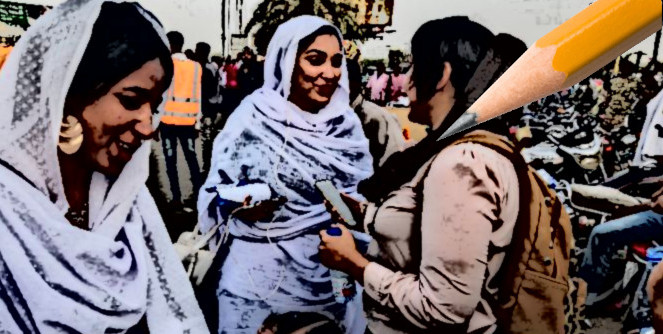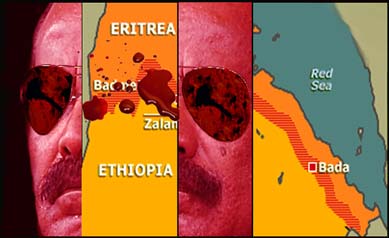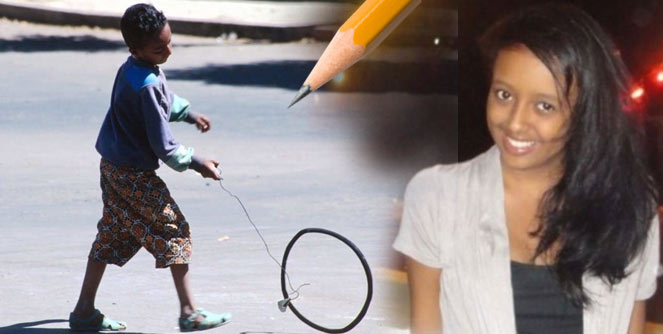Eritrea’s National Congress: Avoid Failure Of Imagination

There are many tragedies in recent history—9/11, Somalia, the mess in the Congo—that could have been foreseen by smart people but weren’t. Such failure to predict what is predictable is called “failure of imagination.” And this could happen in Eritrea. The State of Eritrea is giving warning signs that it is about to implode. Future generations of Eritreans are not going to be very forgiving of us when they learn that Eritrea had a brutal government—one that is exiling Eritreans by the tens of thousands, blocking the return of tens of thousands, conscripting tens of thousands, is responsible for the disappearance of thousands, and the detention in underground and desert camps tens of thousands more—and that their fellow citizens tolerated it without waging an effective resistance. What is needed now is for all of us to walk around like we are on fire—to REMOVE FROM POWER THE ODIOUS PFDJ—and, equally importantly, to address all the fear and concerns of those who worry of what will replace PFDJ.
The Minimum Demand From PFDJ
If you believe in God, you will say that every human being is born with rights—right to a life of dignity. In the Quran, God does not say, “we have honored Muslims”. He says, “We have honored the children of Adam.” And the Bible doesn’t call on Christians to honor Christians. It says, “Honor all people, love the brotherhood, fear God.” So, Eritreans, as human beings, were given rights by our God. Even if you do not believe in God, then you surely must believe that the death and maiming and forced exile of tens of thousands of brave Eritreans to liberate the country from Ethiopian occupation is enough of a down payment for Eritreans to have earned the right to be free and ENTITLED to their human rights and civil liberties effective May 24, 1991.
This right cannot be waived or deferred for whatever reason. Border wars, demarcation, state building or whatever excuses the PFDJ comes up with are just that: excuses. This is a right that Eritreans have earned—paid for in blood—and the PFDJ must not, and cannot, be allowed to come up with endless excuses to defer it. This demand, the demand to restore the rights of Eritreans is non-negotiable. These rights include freedom of speech, freedom to organize, freedom to justice, freedom to worship, freedom to movement and, topping it all, freedom to hire and fire their government. If Eritreans demand that right emphatically and un-apologetically, they do not have to be mired in the details: Eritreans demand their right to be free citizens, and they will not put up with the PFDJ’s trick of treating their RIGHTS as if they were PRIVILEGES that it bestows on its favored class of cheerleaders and bootlickers. It is not up to the PFDJ to grant and deny citizenship rights, and Eritreans do not recognize its corrupt system of cronyism: bestowing special privileges on its donors and political contributors.
This is not negotiable. PERIOD. The first test of whether an organization is part of the resistance or part of a confused group of weaklings is whether it believes that the freedoms and civil liberties of Eritreans must be RESTORED unconditionally or if they are to be bartered for some “soft landing” deal for the PFDJ. Anyone who negotiates with the PFDJ to get it to agree to “give up” on this minimum demand must be treated as no better than the PFDJ—a corrupt and power hungry system.
The upcoming Congress must be explicit about this. It must say that Eritreans have earned their right to be FREE and that any hurdles and preconditions the PFDJ presents are, on their face, prima facie, unacceptable and rejected. PERIOD.
The Post-PFDJ Eritrea
Eritrea is a diverse country and there are many voices that fear that PFDJ will be replaced by PFDJ-2 or something just as bad. And every single voice that has reservations, anxieties, concerns, fear and trepidation is legitimate and MUST BE HEARD. No concern is more valid than the other, and no concern must be dismissed.
There are Eritreans who believe that the only way to prevent PFDJ-2 is that they should never put themselves in a position of ever accepting a highly organized central government. Their concerns must not be dismissed.
There are Eritreans who believe that the only way to prevent PFDJ-2 is that Eritrean cultures and customs must be given primacy. Their input must not be dismissed.
There are Eritreans who believe that the only way to prevent PFDJ-2 is that highly ideological organizations must never be allowed to have predominant role in politics. Their concerns must not be dismissed.
There are Eritreans who believe that the only way to prevent PFDJ-2 is that all the characteristics that define the PFDJ—ultra nationalist, militaristic, jingoistic—must be tempered. Their concerns must not be dismissed.
There are Eritreans who believe that the only way to prevent a fate “worse” than the PFDJ is to ensure that an ideology that relies too heavily on religious beliefs must be tempered. Their concerns must be treated as valid and must not be dismissed.
The Pencil has often said that if you get a diverse group of Eritreans to discuss, openly, all their hopes and fears, within days, they will come to realize that their differences are not difficult to bridge and that they share the same hopes—a free, a just, a democratic and prospering Eritrea—and the same fears—an unjust state consisting of the dominant and the dominated, jumping from war to war, and tearing at the seams. We continue to believe that the National Congress will, just as previous attempts by Eritreans, come up with a winning formula, a vision of Eritrea that allays the fears and restores the hope of citizens.
Know Your Audience
The first question the Congress must ask itself is this: how would we behave if our deliberations were broadcast live to our population in Eritrea? Do our deliberations reflect the urgent nature of their misery? Do we recognize their priorities? Do they, wherever they live in Eritrea, see themselves and their values reflected in the make up of the Congress?
If prisoners at Eira-Eiro or WiA or Carcere or any of the dozens of underground prisons are listening to the deliberations of the Congress, would they be hopeful? Would a mother who has 4 children who have been conscripted for over a decade see a ray of hope? Would a young man who has been lifting rocks for years see relief in sight? Would a young woman who has been the concubine of some corrupt colonel allow herself to smile again? Would those persecuted for practicing their faith be hopeful? Would a father who, having been emasculated by the PFDJ for two decades and no longer feeling like a man, feel pride in his countrymen? Would those who have been languishing in miserable refugee camps feel like their countrymen have not forgotten them?
As obvious as it might seem, many of our political actors keep forgetting that the purpose here is not to win the affection of the loud Diaspora, or the deep-pocketed NGOs, or those filing their reports from various embassies. It is to provide relief to Eritreans, and that begins with recognizing their priorities. And topping that list of priorities is the immediate and unconditional restoration of their rights and civil liberties.
Translating Words Into Action
In the past 10 years, the Eritrean resistance has had many false starts. We should not spend a great deal of time obsessing over the past because the focus is on saving the present, but we must pause long enough to review and to learn from our collective mistakes.
Evidently, the tyrannical regime in Eritrea will never relinquish power to the people willingly. If that was not so, Eritreans would have saved themselves from the unnecessary struggle that is imposed on them. Therefore, the situation calls for readiness to engage the illegitimate Asmara regime with determination. It is vital that all freedom loving Eritreans focus their attention at snatching Eritrean freedom from the regime. There is an abundance of historical lessons in dealing with tyrants that we should remember: a final showdown with tyrants is inevitable. The Eritrean resistance should brace itself for a decisive final showdown with the regime. This should be spelled clearly in words. But words are nothing unless they inspire people to action. With that in mind:
(a) Identify tactics and strategies of restoring the lost rights of Eritreans; isolate the regime internally, regionally and internationally.
(b) Identify ways and means to mobilize Eritreans inside and outside the country for this just cause;
(c) Design a streamlined, lean organizational structure that enables the organizers and the organized to communicate openly and frequently, and to carry out tasks efficiently;
(d) Identify ways to provide Eritreans in Eritrea with current information of the progress you are making towards restoring their civil liberties. Conversely, be explicit on what you are demanding from the Eritrean people to demonstrate that they support your struggle or what changes they would like you to carry out in waging it, and find a way to distill the WILL OF THE PEOPLE, the MAJORITY OF THE PEOPLE, as opposed to the current methodology of anecdotal sampling of people who reflect your own bias;
(e) Elect a bold leadership that is capable of carrying out its responsibilities voluntarily, competently and on full-time basis. Shun the temptation to create an unnecessarily large and bloated structure with the sole aim of distributing positions to stakeholders. There will be a day for power negotiation and distribution, now is the time for electing bold, competent, hard working leaders.
(f) Emphasize that the struggle is not about satiating the egos of ambitious individuals who want to secure positions of power when that power still requires a lot of hard work and sacrifice.
(g) In order to streamline the resistance and encourage mergers (and voluntary suicide) of organizations, create yardsticks and measurements to identify what is a political organization and what is a civil society organization. There is no way to do this without creating winners and losers, the losers will issue their crybaby dissent statements at wedogeba websites: accept it as inevitable.
(h) At a minimum, agree on a set of principles that will guide the resistance to tyranny.
Of all the action items, the item that deals with leadership is probably the most important. Leadership matters. Without the right leadership, the cause is likely to advance at a snail’s pace. There is a dire need for bold leaders who are not intimidated by the “might” of the PFDJ; competent leaders who are more oriented towards results, not just process; leaders who can lead the cause on a full-time-basis, not whenever they can get time off from their day jobs. Leaders who are motivated, and leaders who can inspire, and leaders who can lead and deliver results!
If the congress is able to meet these challenges, the thing that Eritreans crave the most—relief from the brutal rule of the PFDJ—can become a reality.
2011 has been the Year of the Tremor for Tyrants, including the autocrat “Brother Leader” Moammer Kaddaffi, who was such a role model for Isaias Afwerki that he commissioned his henchmen to translate the dictator’s manual, the Green Book, into Tigrigna. If the Eritrean resistance gets focused and disciplined, there is no reason why 2012 cannot be the Year of the Tremor for Tyrant Isaias Afwerki and his cheer-leading squad.




Awate Forum